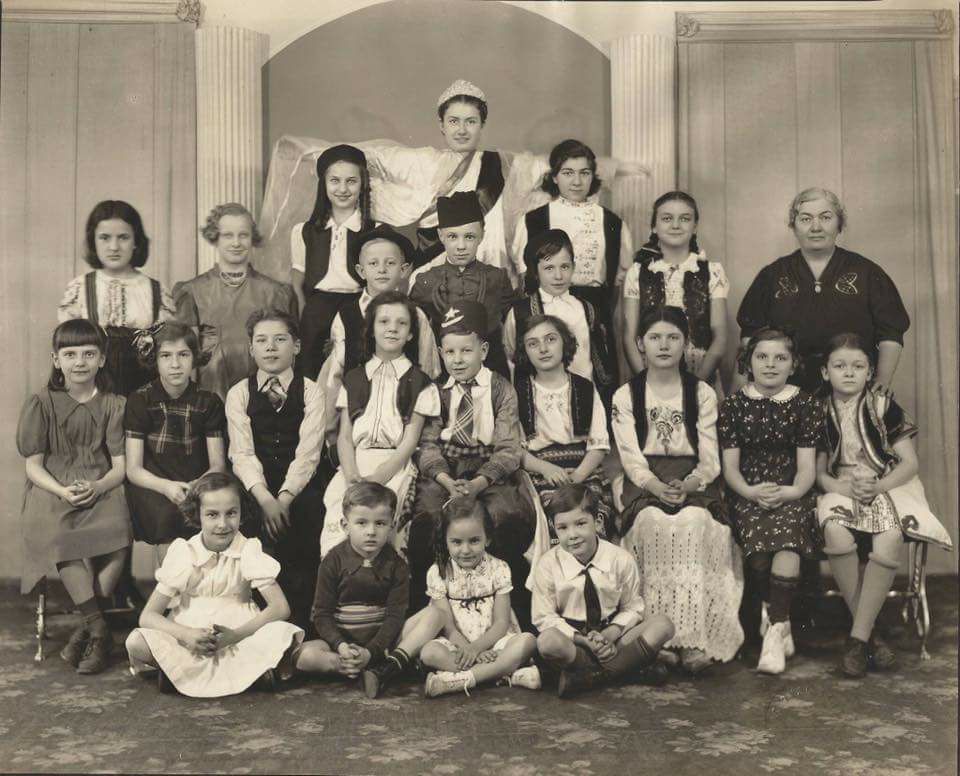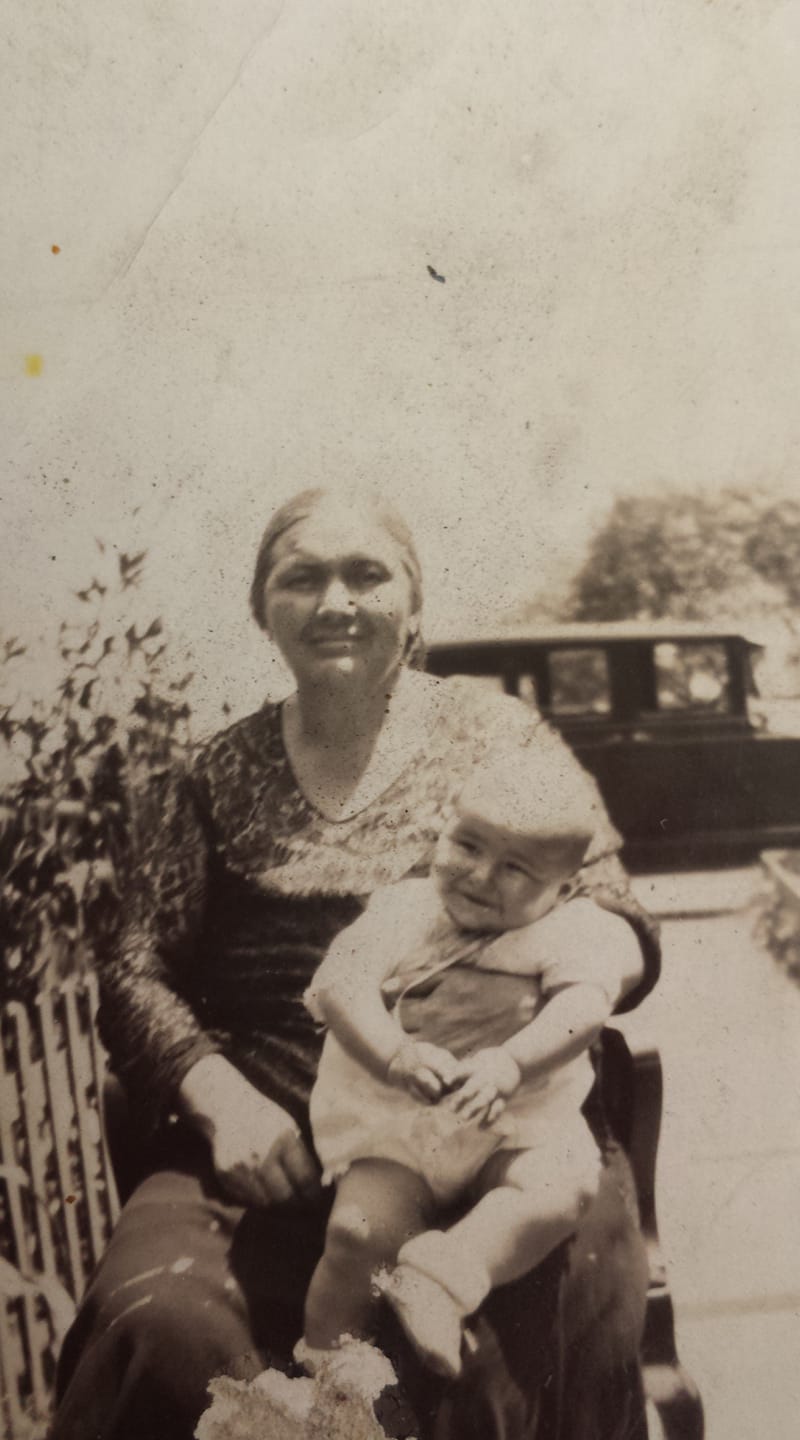by Yvonne “Von” Trbovich Orlich
How does one write about someone they have never met? At least, not literally.
Every year on May first I wake up and think, Wow today is ( number of ) years since our Baba Ljubica passed away at the ripe young age of 57 in 1943. That was a few years before I was born. My own brother was not quite a year old at the time. But, her persona is forever in my mind, and heart, and genetically we are, of course, forever connected. What I know of her is what I have learned from repeated stories over the years from her loving children and the many Serbs around the country who knew of her kind spirit, generosity, and unending love. But, I feel as if I and her many other grandchildren did actually know her.
My maternal grandmother or Baba was born Ljubica Lalich in Selo Sremušina, Bjelovar, Slavonia on July 7, 1885. She immigrated to the United States in 1901 on the Aquitania. I know this from the detailed listing of the family births and deaths written down by her son, my Uncle Adam; the man had a memory like a steel trap. What he didn’t relate in words, he thoughtfully wrote down. Baba arrived and lived briefly in and around Pittsburgh, Pennsylvania, where her first children were born. Dragutin and Cvijeta (Vietta) were the offspring of Baba Ljubica and her first husband. Dragutin died in his first year, but Cvijeta lived to her late 80s.
Later, Baba married our grandfather, Deda Nikola, and subsequently gave birth to 14 more children. Four of these didn’t survive, due to a miscarriage or having died at birth or within their first year of life. Ten survived – Vietta, Eli, Adam, Ted, Eva, Marco, Pete, Mila, Sophie and Mary. Having this many children is unimaginable to me, but was certainly not unusual in those times. Nor was the lifestyle. As portrayed in the movie “The Popovich Brothers of South Chicago,” it is known that my grandparents and their brood lived in mining camps throughout the Southwest in Nevada and Colorado for many years, moving to wherever the next mining job was. At last, their final move in 1929 was to the Midwest where her sons found work in the steel mills.
During their years in the different mining camps, they lived through some rugged and brutally difficult times – as all miners did in those days. They suffered mine collapses, mine explosions, mine strikes, anti-strike violence, poor housing conditions, little pay for the back-breaking work they gave, and they took in boarders; all in an effort to provide for their ever-growing family.
Ljubica was unusual for the immigrant women of her time. She learned to read and write English. I don’t know where or how she learned the language, but we were told it was a great source of pride for her. She was, obviously, strong, both physically and emotionally. How could any woman bury as many children as she did, and keep on smiling and singing and teaching her children the songs of her native land? It amazes me to this day.

Who can ever know the pain and heartache she carried? Ah, but, there were always songs to learn and sing and music lessons to be found for her older children. Perhaps music was the salve that soothed her wounded soul. In South Chicago, where they settled, Ljubica was well known for her many Serbian plays. She not only directed the children in these efforts but, usually made the costumes for them as well. She was an accomplished seamstress. My own mother often told me that she would go to bed at night and the next day when she got up Baba would have a new dress made for her. She also made elaborate costumes for her sons’ orchestra performances as the Popovich Brothers.
My mother, and her siblings, would speak of Baba’s great cooking skills, also. There was a wonderful lady at St. Sava in Gary, Indiana, who was renowned for her fine Serbian cooking, and was extremely proud to say that Ljubica Popovich taught her to cook. Baba was well-known and admired by Serbs from all over the US and Canada for being a gracious hostess, whether her company was planned or on a moment’s notice. Many Serbs would come to Chicago to visit Club Selo, the tavern owned by my uncles, the Popovich Brothers. Their talents with tambura instruments and song were showcased there. When I was younger I would often meet older Serbs at Serbian events who knew the Popovich family from visits to Club Selo. They never failed to praise our dear Baba for the amazing krofne she would make late at night when her home would be taken over by out-of-town visitors following a night of revelry at Club Selo. Her door was always open, and the singing continued until the wee hours, while Baba was sure to feed not only their appetites but their memories, too.
My most frequent storyteller of Baba and her life and accomplishments was my own mother. Many of her reprimands or pearls of wisdom began with, “My mother used to say…” She often told me that, while Baba was a loving and kind woman, she could be a hard task-master. One example took place several years before my mother married (at the age of 20). One of my mother’s duties was to clean the wooden porch of the house with hot water and a scrub brush, on her hands and knees (it seems there was no more precise way to clean, even when I was young). Mom said she dutifully completed her task only to have Baba come out to the porch and ask, Misliś da je to čisto? (Do you think that’s clean?) And, with that comment, Baba would throw another bucket of hot water on the floor and direct her to clean it again. I was met with that same question often in my own childhood. Mom also told me that Baba would always say, Nikad ne udaraj majku. Ruka će vam se ukočiti (Never hit your mother because your arm will go stiff). I don’t know who would have ever entertained hitting her, but I am fairly confident it never happened. It’s not a dare I was ever willing to take.
The years of hardship from harsh living conditions, taking care of boarders and a house full of children, and who knows what underlying health issues took their toll on Baba at an early age. On May 1, 1943 as she was waiting to be picked up from the hospital following a brief stay, she stood at the sink and washed her hands, and in a moment she collapsed and died at the age of 57. A few of my oldest cousins, who were but children in 1943, always tell the story of standing on the porch of Deda and Baba’s house on Commercial Avenue across from St. Archangel Michael Church and waving as the funeral of their beloved Baba passed by. They tell of her sweetness and even of her sweet voice. Amazingly, an old recording was found among Uncle Adam’s many mementoes. It was an early recording – a novelty at the time. And we could hear our Baba talking! We actually got to hear how sweet her voice was, and it further embedded thoughts of her in our hearts. How we cried when we heard that recording, what a wonder it was.



Those older cousins were fortunate to have really known Baba. They remember her hugs, her songs, and her kisses. We younger grandchildren of Baba Ljubica are fortunate to have been showered with stories of her all too brief life. We were blessed that a little of her was passed on to each of us both genetically and through the remembrances of her love for her family.
It always touched me that when any of Baba’s children, now grown adults and Babas and Dedas in their own families, would speak of her. We all love our mothers and speak lovingly of them, but I always felt and heard a sense of reverence in their voices when any of the ten (10) surviving children spoke of her. It seems she touched everyone in that way.
Would that I and so many of my cousins could have had the privilege of being in her physical presence. Oh, to have been hugged by such a woman! But, her presence is always with us. This amazing woman who came to a new land, coped with what must have been unbearable grief and struggles, but who remained a pillar not only in her own loving family, but in her community. Wherever that community might have been.
Vjećnaja pamjat, Baba. Memory eternal.
Yvonne Orlich was raised in Northwest Indiana. Both her parents were first generation American born Serbs. Her father, Manuel, was born in Minnesota and raised as an orphan by his uncle, Mihailo, in East Chicago, Indiana. Her mother, Mila Popovich, was born in Ruth, Nevada, the eighth of ten children of Nikola and Ljubica Popovich and subsequently raised on the South Side of Chicago. She now lives in the Phoenix, Arizona metro area; her older brother, Marco, lives in Pittsburgh, Pennsylvania. Yvonne can be contacted by email at: yorlich@gmail.com
All Rights Reserved – Femigration 2021; for reposts, please link back to femigration.com
All photos shared are from the author’s personal collection.
Main photo: The Ilija and Ljubica Popovich Family
Center photo: Baba Ljubica (far right) shown with the children in the cast of her play.
Bottom photos: (l) The Popovich Brothers wearing costumes made by their mother. (c) Ljubica Popovich (2nd row, 4th from left) in the photo for KSS Knjeginja Zorka, South Chicago. (r) Baba Ljubica with one of her grandchildren

Beautifully written. Thank you for sharing your memories, Von.
LikeLike
Your wonderful writing makes Baba Ljubica come alive!
LikeLiked by 1 person
Wonderful story! Baba was a role model fir all women! Make the best of your situation! Make time for what you value and believe in!
LikeLiked by 1 person
How my English mother took me and my brother on train and ferry ,travelling for 2 days and 2 nights from u.k.to SerbiaTo make sure my grandmother .Baba kosara met us before she passed I was 5 and my brother 7.And again when I was7 and my brother9.Just to make sure she saw her grandchildren .Back then things were very basic in the village .No running water or inside loo and bathroom .This is a experience I will never forget .leaving my dad on the train platform as we left for Serbia .My mother was very brave to take on this journey.,So a grandmother could see her grandchildren.
LikeLiked by 1 person